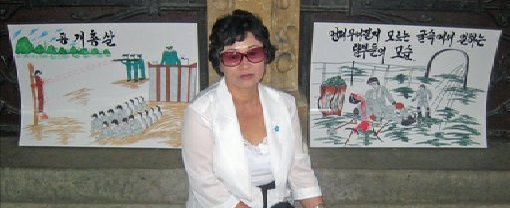Last week, on June 28th 2011, David Alton chaired an Evidence Hearing in Parliament, which took testimonies from two north Koreans and two other witnesses:
Mrs Kim Hye Sook
Artist and defector Kim Hye Sook spoke of her 27 year incarceration in Yodok prison camp, where she was taken aged 18. She showed a series of her own paintings depicting the suffering she witnessed and experienced first-hand. Mrs Kim used the pictures to explain to the group what a normal working day in “Camp 18” was like, from the manual labour undertaken by prisoners and scarcity of food provisions to the regular public executions and cannibalism she saw over her 27 years imprisonment. She spoke about the death of her son in the camp. She then produced a map she had drawn from memory of the layout of the camp which was photographed by some of those who attended.
A recorded interview with Mrs Kim was broadcast on the Today Programme on the 30th June, linked to here: http://news.bbc.co.uk/today/hi/today/newsid_9526000/9526601.stm
Mr Kim Joo Il
Mr Kim explained to the group that he was a political dissident who fled North Korea to settle in Britain after being forced to serve 11 years in the North Korean military until his escape in 2005. He thanked the British people for their hospitality to North Korean dissidents and the UK Government for allowing them entry. He spoke of malnutrition in the camps and the tendency of the DPRK to lavish gifts upon their most loyal supporters. He then showed a video of North Korean women to illustrate the level of hysteria, the use of propaganda and inoctrination.
Mr Ha Tae Hyung
Speaking about his experiences with Open Radio North Korea emphasised the need to provide more information about the situation in DPRK. He explained that communications within DPRK were extremely difficult and necessarily underground. According to Mr Ha, owning a mobile phone from a banned network could lead to public execution. He continued to provide an analysis of the power base of the North Korean government, speculating that it was increasingly diminished and that this was likely to lead to more frequent and severe human rights abuses to try to secure that the authority of the government is respected.
Rajiv Narayan (of Amnesty International)
Mr Narayan spoke about the rarity of Mrs Kim Hye Sook’s story as so few dissidents escape camp 18. He explained that Amnesty have concentrated their research on Yodok prison camp in which around 50,000 people are imprisoned, and is around the size of a mid-capacity Unites States city. He stated that agricultural production for the camp had increased, indicating that the numbers of incarcerated person might be rising. Mr Narayan added that Amnesty International estimates that two of every five prisoners die in the camps. He showed the group a video Amnesty have produced, most of which can be viewed at the following link:
http://www.youtube.com/watch?v=1y0yhV6IT7o
Questions:
The chair opened the floor to questions which included queries about the best way to pursue the constructive, but critical engagement policy favoured by the All Party Group on North Korea; what international actors can do to raise the issue of the camps with the North Koreans who still deny their existence; to what extent North Korean citizens know about the human rights abuses that occur within the camps; and the position of the Chinese towards escapees and whether the diplomatic efforts of the UK have borne any fruit.
the Chinese towards escapees and whether the diplomatic efforts of the UK have borne any fruit.
The questions were answered by the four guests of the group, the Chair and Vice Chairman Jim Dobbin MP.
Conclusion of the evidence hearing
The chair thanked all attendees and expressed satisfaction that so many interested parties had come to hear the evidence.
North Korean Witnesses Give Evidence to Parliamentary Hearing about Human Rights Issues

For 18 years David Alton was a Member of the House of Commons and today he is an Independent Crossbench Life Peer in the UK House of Lords.
Social Media
Site Search
Recent Posts
£1 Trillion – Raised In Parliament Today. The Cost of Reparations In Ukraine and Bringing To Justice Those Responsible.
https://youtu.be/xlEfrgwELvc Alongside the...
Stop Perpetrators Getting Away With Genocide – Public Letter sent to the UK Prime Minister and Foreign Secretary on the Genocide Determination Bill 2023-24. The letter was published this morning, 17 April 2024, 06:00 am UK time.
Stop Perpetrators Getting Away With Genocide -...
